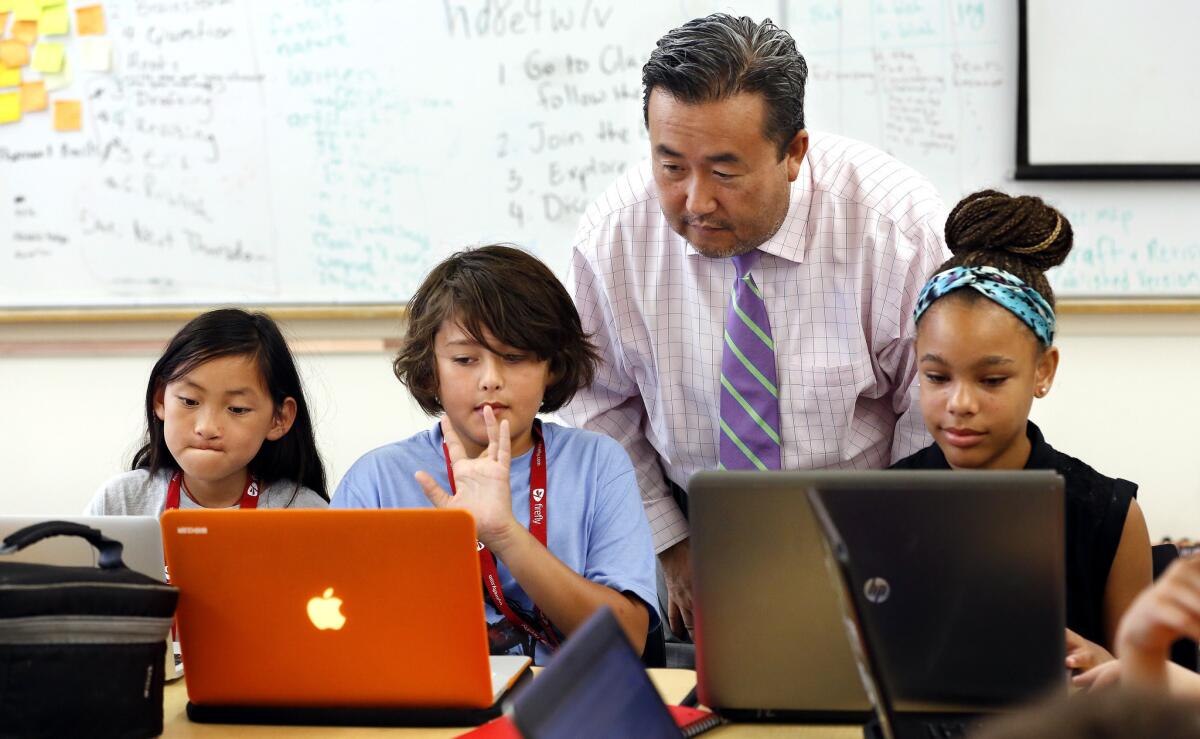Girls and boys, the lesson today is how to start your company

Principal Roy Park with sixth-graders graders, from left, Rebecca Halbert, 11, Bodhi Seidman, 10, and Kennedy Williams, 11, create a video game in a class where students learn to work in startups and manage their time.
As their colleagues remove piping-hot filament clogging a 3D printer, Westchester-based entrepreneurs Hazel Holmes and Jameel Mamdani step aside for a status meeting on their startup. Holmes is setting up the company’s Etsy page, and wants to start selling the 3D-printed trinkets as soon as possible.
About 13 miles east in South L.A., around 40 Exponential Entrepreneurs learn about startups in Israel and virtual reality in the U.S. Echoes of “oohs” and “cool” bounce through the room when they hear about the future of virtual reality in movies: Soon, they’ll be able to walk into them — and even work on their production.
The Times’ new education initiative to inform parents, educators and students across California >>
The entrepreneurs at both locations are students.
Holmes and Mamdani are sixth-graders at the Incubator School, a pilot school in Westchester that opened in 2013. The Exponential Entrepreneurs are tenth-graders at Nava College Preparatory Academy, and the recent Monday class was an elective developed by Marcus Shingles, a Deloitte Consulting principal in the company’s innovation group.
As South Bay communities increasingly become a sun-kissed complement to Silicon Valley, startup culture is making its way into some L.A. schools’ curricula, too.
Launching a business as part of a class isn’t a new idea. What’s new with these schools, at least in Southern California, is the brand of entrepreneurship, the infusion of technologies as integral to one’s business. There are summer camps or after-school programs that teach tech startup skills and act as incubators for students, but classes and schools devoted to that are more rare.
***
“The stuff you’re learning about now is right in your backyard,” Shingles tells the students, dressed in their uniform of black pants and white collared shirts. “You can go get summer internships.”
Shingles, who works with both startups and the large companies that often fund them, created the elective because he realized that students, particularly those in low-income neighborhoods, likely don’t have access to the resources to learn about these emerging technologies.
An English and a math teacher co-teach the class, and Shingles comes in once in awhile to meet with the students and share his experiences.
If any of the students are interested in technology or starting a business, these are the technologies they need to know. And much of traditional science, business, or math curricula doesn’t give them that exposure to even find out if they’re interested, Shingles said.
This year, the Nava Prep students will learn about the different technologies—advanced robotics, artificial intelligence, digital fabrication, to name a few—by breaking up into research groups and presenting them to each other.
The English and math teachers are learning about the technologies along with the students. Next year they’ll learn about how to fund tech startups with sources like crowd funding or prize-based competitions. The last year, when they’re seniors, the goal is to actually launch startups.
“We don’t know if it’ll work,” Shingles said. “But we think it will.”
***
The Incubator School occupies a few hallways in the campus of Westchester Enriched Sciences Magnets, close to the 12 acres of land that Google recently bought, plus a gaggle of new Playa Vista tech offices. Right now the school has sixth- through ninth-grade students, and will eventually extend through 12th grade.
The goal of the school is to infuse today’s style of entrepreneurship into everything the kids do, to prepare them both for a traditional college route, or to run their own business after graduating (and during school), or both.
Here, a social studies lesson for seventh- through ninth-graders involves asking students to think about the founding fathers in design terms: What is the problem they needed to solve, who were they serving, how did they solve it?
See the most-read stories this hour >>
Sixth-grade clubs don’t happen after school, they’re during second period under the supervision of STEM teacher Pamela Stiles and the school’s founder, Sujata Bhatt. Traditional school clubs most closely resemble companies in terms of structure, Bhatt said.
So the school capitalized on that — in Bhatt’s classroom, about two dozen kids are clustered into four groups, each working on a different project. There’s an animation club creating something that has to do with Bill Gates and a money nest, a game design club using programming to try to make a polar bear’s legs move across the screen for a game about global warming, a creativity club developing a design challenge so the school will have a mascot.
Each group has a CEO -- a position that is rotated every few weeks, unlike in real life -- and the clubs set goals each month and calls them “deliverables,” just like a business would. By eighth grade, the goal is for students to launch their own startups within the school.
They also learn to manage expectations, and are taught that failure is perfectly OK.
The all-star club in Stiles’ classroom — the sixth-grade team making the Etsy page to sell 3D-printed items, plus hand-drawn artwork and bracelets — plans to sell the products on Etsy.
Holmes is eager to start selling the 3D-printed items—dinosaur heads, rockets, other small knicknacks— but Mamdani knows they they won’t have the production cycle ready until next month, he tells her. Class is almost over, and the team is on its fifth attempt at making a single rocket.
It doesn’t actually print until a few more rounds of filament-cleaning.
***
Schools ingrained with the tenets of startup culture may be more established in Northern California, where parents are the tech executives and understand what skills their children need to lead the next generation.
It makes sense that the practice would spread to Southern California as Silicon Beach grows, said Estelle Reyes, Los Angeles director for the Network for Teaching Entrepreneurship, an organization that trains teachers for entrepreneurship classes.
As kids interact with technology more, either through field trips or speakers or the games they play on their phones, their business ideas grow from cupcake or T-shirt companies for community members to apps that can reach thousands, Reyes said.
“Kids are getting more and more exposure to [technology],” Reyes said. “So they’re learning how to solve problems in a more sophisticated way.”
But moving from traditional, lecture-based learning, to allowing students to launch tech businesses as part of curricula? That might take a long time to implement widely, she said.
“Our school system is so archaic that it’s like moving a mountain,” Reyes said. “It’s very hard to disrupt it. There’s small little murmurs here and there, but there hasn’t been a revolution.”
Reach Sonali Kohli on Twitter @Sonali_Kohli or by email at Sonali.Kohli@latimes.com.
More to Read
Sign up for Essential California
The most important California stories and recommendations in your inbox every morning.
You may occasionally receive promotional content from the Los Angeles Times.










